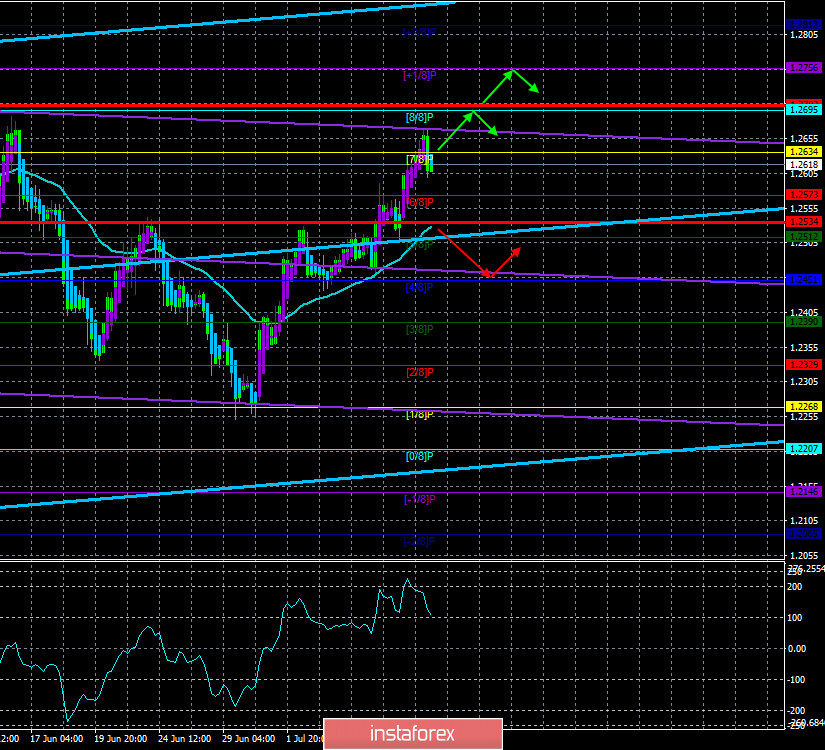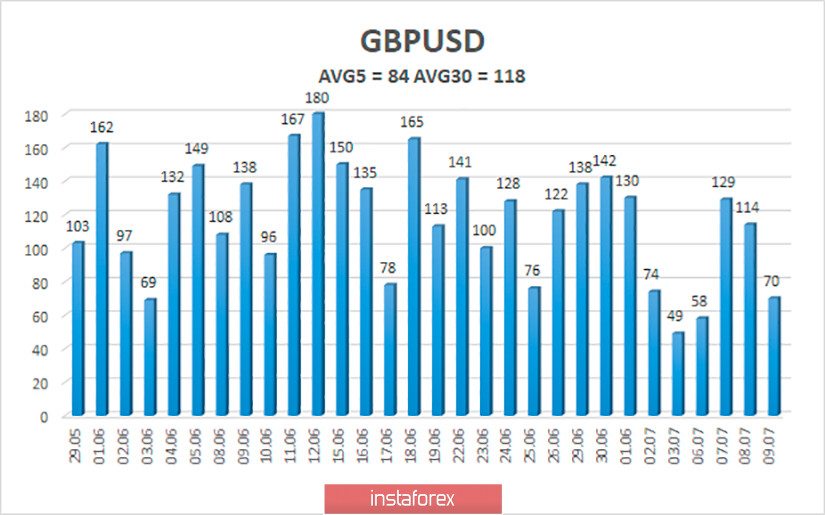4-hour timeframe

Technical details:
Higher linear regression channel: direction - upward.
Lower linear regression channel: direction - sideways.
Moving average (20; smoothed) - upward.
CCI: 105.7463
The British pound has been trading higher for most of the last trading day of the week. Market participants still attached high importance to what is happening in the US at this time and ignored all the negative news about the negotiations between Brussels and London. This is partly true. The British currency has been falling in price on Brexit news for the past three years. Now, when for once things are not so bad in the UK against the backdrop of America, why should the pound not show the maximum possible growth? We certainly do not believe that the British currency can return to, for example, $ 1.35 in 2020. However, in general, if you look at the monthly chart, it is obvious that the long-term downward trend in the pound has been maintained since 2007, and the last four years are just its final stage. Thus, against the background of a fall from the level of $ 2.11, the decline in the last 3-4 years looks scanty. But the US economy has finally begun to allow other currencies to breathe more easily. What will happen in the long term is still unclear. However, while there is a chance to grow, you need to grow.
Over the past day, no new news was received on the topic of Brexit and negotiations with Brussels. But more and more experts and political scientists are closely examining the situation with Hong Kong. Recall that under the agreement with London in 1984, Hong Kong must maintain a special status (something like autonomy) in China for 50 years, starting in 1997. The city should have its judicial system, government, currency, and other attributes of independence independent of the will of Beijing, leaving only issues of international politics and national security to the Chinese capital. However, the adoption by Beijing of the law on "national security in Hong Kong" levels the entire autonomy of Hong Kong, since any citizen of Hong Kong can now be tried under Chinese laws, accusing him of terrorism, espionage, and any other actions that endanger Chinese security. Naturally, Beijing immediately came under criticism not only from the US but also from the UK, the European Union, and Australia. Experts believe that now there will be tension in relations not between China and the United States, but between China and the whole world. And here, the formation of the so-called "anti-Chinese coalition" will be just in Washington's hands. In principle, China, despite all its power, which allows it to conduct an equal dialogue with the same States, can be said to stumble over the same rake that the Soviet Union and the other Communist States previously stumbled over. Excessive concentration of power in one hand, the absence of a coalition as such - is not always good. All power in China is the CPC (Communist Party of China), and the CPC is Xi Jinping, its leader. The calculation of the Chinese government, according to many political scientists, is extremely simple. Since much of the world depends on the Chinese economy and Hong Kong's financial flows, the CPC believes that neither the United States nor the European Union will simply escalate the conflict and turn a blind eye to its actions concerning Hong Kong. The Chinese leadership believes that the capitalist West is primarily guided by the principles of business, and therefore will not allow itself to miss the profit that could be obtained by continuing to cooperate with China and Hong Kong on its Chinese terms. And even more so, Western capitalists are unlikely to voluntarily give profits to competitors, who can very quickly displace American companies and American businessmen from the Hong Kong "pond". And here, much will now depend on the ability of all those who are dissatisfied with China's policy towards Hong Kong to conduct targeted actions. The European Union and the United States can "express dissatisfaction", impose sanctions against 5-10 Chinese officials and thus end the process of proceedings, as it is called, peacefully. Formally, the sanctions will be imposed, but not really. But if the EU or the US impose real sanctions, which may concern tourism, trade, various technologies, and financial transactions (yes, the notorious SWIFT international payment system), then China's prestige and well-being may be seriously damaged. In this case, it is unlikely that Beijing will sit back and not strike back at its enemies. This means that the world may face a new cold war, new trade conflicts, and well if nothing else. And strange as it may seem, the future US presidential elections will be of great importance for the development of mitigation of the US-China conflict, which can involve the whole world. If Trump wins the election, there is no doubt that he will continue the dialogue with China from a position of strength. There is no doubt that new sanctions and trade restrictions will be imposed, and at the same time, Washington will seek to win over other major world players to create a blockade for China, as much as possible to limit its capabilities and influence in the international arena. China, of course, will respond and we hope that another virus will not break out from some laboratory. If Joe Biden, who is known for his friendly attitude towards China, wins, there is no doubt that relations between the two economic giants will be on the path of easing and improving. What will be beneficial at the end of the whole world? We are not going into a more complex and long-term policy now.
Well, in the shorter term, the "coronavirus" epidemic in the United States is more important. We do not see any other reasons for the sharp strengthening of the British currency. However, we believe that such grounds for buying the pound may cease to apply at any time. This means that we should not forget about technical factors that are more important at this time. Moreover, the macroeconomic reports continue to be ignored by traders, the future of both the British and American economies is unclear, and no publication or speech by a high-ranking official is planned for the last trading day of the week.

The average volatility of the GBP/USD pair continues to remain stable and is currently 84 points per day. For the pound/dollar pair, this value is "average". On Friday, July 10, thus, we expect movement within the channel, limited by the levels of 1.2534 and 1.2703. Turning the Heiken Ashi indicator upward will indicate the resumption of the upward movement.
Nearest support levels:
S1 – 1.2573
S2 – 1.2512
S3 – 1.2451
Nearest resistance levels:
R1 – 1.2634
R2 – 1.2695
R3 – 1.2756
Trading recommendations:
The GBP/USD pair started a weak correction on the 4-hour timeframe. Thus, today it is recommended to open new buy orders with the goals of 1.2695 and 1.2756, after the reversal of the Heiken Ashi indicator to the top. It is recommended to sell the pair after fixing quotes below the moving average with the first goals of 1.2451 and 1.2390.
 English
English 
 Русский
Русский Bahasa Indonesia
Bahasa Indonesia Bahasa Malay
Bahasa Malay ไทย
ไทย Español
Español Deutsch
Deutsch Български
Български Français
Français Tiếng Việt
Tiếng Việt 中文
中文 বাংলা
বাংলা हिन्दी
हिन्दी Čeština
Čeština Українська
Українська Română
Română

